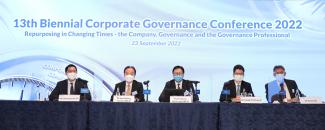
Governance leadership – A critical factor in Hong Kong’s competitiveness?
The fourth session of the Institute’s CGC 2022 addressed Hong Kong’s development strategies and the importance of maintaining high governance standards to reinforce Hong Kong’s position as a premier international financial centre.
Against the backdrop of the geopolitical tensions and economic challenges the world is facing, there has been much debate in Hong Kong about how to boost its competitiveness as an international financial centre (IFC) in the years ahead. The fourth session of the Institute’s 13th Biennial Corporate Governance Conference (CGC) was dedicated to this question.
Development strategies for Hong Kong
The first speaker in this session, Joseph HL Chan JP, Under Secretary for Financial Services and the Treasury, the HKSAR Government, updated the forum on some of the initiatives the government has been launching to boost Hong Kong’s competitiveness. These have focused on strengthening Hong Kong’s status as a premier international asset management and risk management centre.
New measures have just been announced, for example, to promote private equity investments in Hong Kong. Mr Chan noted that private equity has become an increasingly important avenue for raising capital. The government has therefore focused on refining and improving Hong Kong’s regulatory framework to attract more private equity funds to locate here. Over 500 funds have been registered under the Limited Partnership Fund regime launched in August 2020. The government also passed a bill recently to provide tax concessions for eligible private equity fund businesses.
The government has also been seeking to promote fintech development in Hong Kong. Its initiatives in this space have focused on building an infrastructure conducive to fintech development, such as the Faster Payment System (FPS), and the eTradeConnect blockchain-based trade finance platform. The government is also providing funding for start-ups and some proof-of-concept projects.
Upgrading governance standards
A key theme of the second speaker in this session, Amar Gill, Managing Director, Head of APAC Investment Stewardship, BlackRock, was that high governance standards will be a critical factor in maintaining Hong Kong’s competitiveness. His presentation suggested a number of ways in which Hong Kong can improve its track record in governance – starting with measures to boost board independence.
This year, insufficient independence of the board was the biggest issue resulting in negative votes by BlackRock in the Asia Pacific region. In the last 12 months to June of this year, BlackRock voted against 1,100 companies in Asia Pacific – one quarter of its total company exposure in the region – for not having a sufficiently independent board.
Mr Gill emphasised that improving nomination committee practices will be a key part of upgrading standards. The rules making a nomination committee mandatory and requiring listed companies to have an independent nomination committee chair are a step in the right direction, but he pointed out that the nomination committee chair has to be unquestionably independent and not a long-tenured independent director who is there to make sure that all nominee directors have the approval of the controlling shareholder.
In addition, he questioned whether directors who have been on a board for 15 or 20 years can still be classified as independent. ‘Many times they do have the skills that are required, but we think that they should be reclassified as non-independent, because they've already developed a relationship with the controlling shareholder and with management,’ Mr Gill said.
Another factor relevant to how far directors can be said to be independent is the degree to which they interact with investors. ‘There needs to be more interaction of independent directors with investors. That is the hallmark of governance moving beyond compliance to something more holistic,’ he said. To this end, he recommended companies appoint a lead independent director whose remit includes interacting with investors and stewardship teams.
Governance as the language of business
The importance of governance leadership for Hong Kong’s continued competitiveness was further explored in the Q&A at the end of session four. Panellist Laurence Li SC JP, Chairman, Financial Services Development Council, said that high governance standards will play a critical role in maintaining Hong Kong’s competitiveness as an IFC because governance is the language everyone needs to learn to be able to successfully run a company.
‘One way to think of it is this – governance is a language. The common law, and governance checks and balances, are part of the modern language of business and finance. If you want to take someone else's money and grow a business, these are the concepts and these are the rules that you need to abide by,’ he said.
He added that Hong Kong as an IFC leads Asia in having mastered that language. ‘I should probably, at the same time, admit that we have a long way to go, but at least we speak the language and we will in time master the whole system and be able contribute as an IFC,’ he said.
Attracting and retaining human capital
Another key factor for Hong Kong’s success will be its ability to attract and retain human capital, and this was another topic explored in the Q&A. Panel Chair Professor Frederick Ma Si-Hang GBS JP, Chairman, FWD Group Holdings Ltd, asked panel members for their views on whether Hong Kong’s Covid restrictions have led to it falling behind its competitors in terms of being able to attract and retain human capital.
Dr David Wong Yau Kar GBS JP, Chairman, Council of the Education University of Hong Kong, pointed out that Hong Kong has known for some time that a labour shortage was coming. ‘Even 10 years ago, I think that the projection was that our labour force would peak in 2018 and then decline for about eight to 10 years before picking up again,’ he said.
That situation, he added, has been compounded by the Covid restrictions and will continue to be a major problem that Hong Kong needs to address for the long term. Moreover, relying on a single government department to address this problem will not work, he pointed out. ‘For an effective strategy to be developed, it will take a concerted effort involving different government bureaus and departments, including the education, labour, welfare and immigration departments,’ he said.
Joseph Chan emphasised that the government recognises the challenges created by its Covid-19 restrictions. ‘The government appreciates the importance of connecting Hong Kong with the rest of the world and is working hard to rebuild that connectivity,’ he said. He cited the way the government has progressively reduced quarantine requirements for travellers to Hong Kong. The conference took place on the day that the government announced the current ‘zero plus three’ policy – requiring three days of testing but zero days in mandatory quarantine for inbound travellers.
He also cited a number of government programmes to build the right talent pool for Hong Kong. In June 2006, the government launched the Quality Migrant Admission Scheme (QMAS), a points-based entrant scheme seeking to attract skilled people to settle in Hong Kong. In 2018, the Talent List was introduced, giving priority in immigrant facilitation under QMAS to individuals with a background in 13 sectors (including asset management, compliance, ESG and fintech) deemed to be most useful to Hong Kong’s economic development.
ESG leadership
As part of the governance leadership discussed above, session four of the conference also looked at how important high ESG standards will be for Hong Kong’s competitiveness. Amar Gill pointed out that every company will be impacted by the global transition to a net-zero carbon economy. As this trend accelerates, companies will need to have a well-articulated long-term strategy to address the net-zero transition to continue to enjoy the trust of investors. The consequences for companies without such a strategy are clear to see in the tectonic shift in investor capital away from companies with a poor track record on sustainability issues.
‘Climate risk is investment risk – this is how asset managers are looking at it. The net-zero journey has started – it will be uncertain, it will be uneven, but it presents extraordinary opportunities and risks to every company,’ he said.
BlackRock, in its engagement with investee companies on ESG and sustainability issues, has been looking for better transparency – particularly where they are contributing significantly to greenhouse gas (GHG) emissions. Moreover, ‘better transparency’ has become a much more quantifiable concept, Mr Gill pointed out. BlackRock believes long-term investors benefit when disclosures are aligned with the Task Force on Climate-related Financial Disclosures (TCFD) framework, which is structured around four thematic areas: governance, strategy, risk management, and metrics and targets.
‘Metrics and targets’ have been receiving a lot of attention as the International Sustainability Standards Board (ISSB) is poised to release its sustainability-related disclosure standards to harmonise the metrics used by companies globally. Mr Gill welcomed this development and the determination of regulators in Hong Kong to align local standards with those of the ISSB.
‘The ISSB standards will require detailed metrics by sector and this data will make it easier for asset managers to compare how a company is doing against another company in the same sector in another market. This comparability is very important and I think that's very promising in terms of getting companies to take sustainability much more seriously,’ he said.
SIDEBAR: ESG recommendations
The Institute’s CGC 2022 was unequivocal about the need for companies in Hong Kong to start preparing for tougher requirements relating to ESG and climate change. Amar Gill shared with the forum some practical recommendations on how this might be achieved. To be useful to investors, sustainability disclosures need to be about what companies are planning to do now and in the medium term, he said.
Moreover, BlackRock is translating these issues into votes. ‘In the last 12 months to June of this year, we voted against 234 companies for not giving climate disclosures aligned with the TCFD. That included withholding support for the re-election of 176 directors because we felt they were responsible and should be accountable for the failure to provide long-term investors like our clients the disclosures they need to better plan their financial futures,’ Mr Gill said.
Much of the focus on ESG standards has related to the listed company sector, but he added that Hong Kong should also develop a roadmap for unlisted companies. Listed companies are going to find it hard to deliver Scope 3 GHG emission disclosures if they can’t get such emissions data from unlisted companies and SMEs. A basic minimum, he suggested, would be to encourage SMEs to disclose their electricity consumption. This, as a starting point, would enable listed companies to have better access to information and data relating to their Scope 3 emissions.
Finally, irrespective of the regulatory requirements, Mr Gill emphasised the value of making sustainability issues a part of corporate strategy. One sign that this is not always the case is the frequency with which sustainability disclosures are confined to the sustainability report, or buried deep inside the annual report, rather than being up front in the CEO and Chairman statements.


